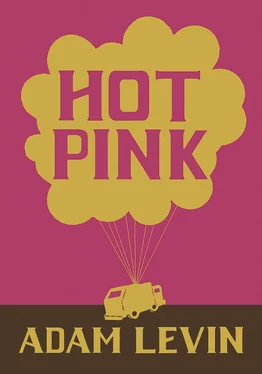I didn’t hang out with the woman cop for long. Half an hour tops. My parents got there fast. They entered the station with the ward alderman, Mikey Podesta — I only knew who he was cause the lady cop told me when the three of them walked past our squeaky hallway — but they left with just me a few minutes after that.
At first they hugged me and checked me over to make sure I wasn’t messed up or anything, but by the time we got in the car, they were getting pissed. At least he was. My dad, I mean.
“Why did you set that dog on the detective?” he said.
“I didn’t know he was a cop,” I said. “I was trying to help my friend. Some guy was attacking my friend, I thought.”
“Your friend who threw a TV at his stepdad,” my dad said.
“He’s just the ma’s boyfriend, I think—”
“Clifford!” my ma said.
“What?” I said.
“You were high on that Dirt Shooter is why you did what you did.”
“I was what on a shooter? I was what?” I said.
“You were high. They saw it right next to you.”
“I don’t know what you’re saying to me,” I said. “I don’t do drugs. I fell asleep on the couch and when I woke up, there was all this ruckus, and my friend needed help — that’s what it looked like — so I went and got the dog to help out my friend.”
“You were asleep?” my dad said. “On the couch next to Franco at eleven in the morning?”
“Yeah,” I said. “We were watching Three Stooges . I hate those guys. You do too. They’re annoying.”
“That’s true,” my dad said.
“I don’t know why Franco likes that show. It put me to sleep.”
“You weren’t on Dirt Shooter?”
“What is Dirt Shooter, Ma?” I said. “I don’t know what that is.”
“I told you he’d never do that Dirt Shooter, Gloria. That was all Franco — I knew it… But you don’t hang out in that fucken garage anymore, Cliff, with that wop.”
“Why not?” I said.
“You know why not,” he said.
I didn’t even really want to was the thing — all of a sudden, I was pretty sick of Franco — but I didn’t like getting told not to, either. Plus I thought I’d seem guilty if I just said okay.
“Well who’s that guy you came into the station with?” I said.
“That’s an old friend.”
“An old friend who?”
“What’s the tone?” said my dad. “His name’s Mikey Podesta. He’s our alderman. I’d have liked to introduce you if the circumstances were different.”
“Why’d Mikey Podesta the alderman go to the station with you?”
“He didn’t,” my dad said. “He met us at the station. He’s the one who told us you were there to begin with, and he met us out front.”
“How’d he know where I was?”
“The cops called him up.”
“The cops called him ?”
“Yeah,” said my dad. “What’s so hard to understand?”
“Why’d they call him ?”
“He’s an old friend of mine.”
“How do they know who your friends are?”
“They know who his friends are.”
“Why do they care who he’s friends with?” I said.
“Cause he’s the alderman,” my dad said.
“Why’s he a friend of yours?”
“What kind of question is that? What’s with all the questions, Cliff?”
“Why do the cops know who you are?”
“I don’t even know what you’re talking about.”
“Before, when they heard my name, one of them said, ‘This is the pilot’s son.’ How do they know who you are? That’s weird.”
“Weird? Nothing’s weird, Cliff,” my ma said. “Your father’s a pillar.”
“A pillar?” I said.
“A pillar of the community,” she said.
“A pillar of the community.”
“I’m a pilot!” my dad said.
We got to our house. The pillar parked the car and turned around to face me.
“You’re not on drugs, right?”
“I’m not,” I said.
“You just thought your friend was in trouble, so you helped him.”
“Yeah,” I said. “Just like I told you.”
He studied my eyes, then he said, “I believe you. It’s been a rough morning, huh?”
“Yeah,” I said.
“Why don’t I take you out for lunch and an ice cream or something.”
“Yeah,” my ma said. “You two should spend some time. Your dad’s flying again on Monday.”
“How about maybe later,” I said. “I want to be alone right now. Think about stuff. I want to take a walk or something.”
“Alright,” my dad said. “We’ll get ribs later, maybe. Or pizza. Whatever.”
“Get some lunch, though, Cliff,” my ma said. She opened her purse and handed me a twenty. “You can keep the change for that. Eat something good.”
I thanked her, and started heading to Theo’s, but then I changed my mind and got Burger King instead.
MIXED MESSAGES // TWO CONVERSATIONS // BILLY // A PROFESSOR AND A LOVER // THE END OF FRIENDSHIPS // CRED // IMPORTANT MEN MIXED MESSAGES
The message the natives, with hand signs, conveyed was: LEAVE OUR CROPS BE, AND WE WILL GIVE YOU OUR DAUGHTERS.
We hadn’t any interest in their crops or their daughters: not their daughters till we realized they were so undervalued, not their crops till we saw that by torching their crops we might teach them to value their daughters more highly.
That our actions could be taken by the natives to mean EVEN TO THE LIKES OF US SEAFARING MEN, THOSE DAUGHTERS OF YOURS ARE OF SO LITTLE VALUE THAT THE PLEASURE WE DERIVE FROM DESTROYING YOUR HARVEST IS PREFERABLE TO THAT WE’D DERIVE FROM THEIR POSSESSION, or perhaps WE WILL TORCH YOUR CROPS AND THEN HAVE YOUR DAUGHTERS did not occur to us — these sorts of possibilities simply refuse, in the heat of the moment, to occur with the facility they occur to you later, in your well-appointed quarters, sipping from a magnum of pupu-tree liquor, reviewing the day’s events in your log — but such misunderstanding on the part of the natives might in fact provide the correct explanation for why they elected, in the glow of the fires we had put to their crops, to pulp all their daughters’ skulls with clubs.
At the time we assumed they were offering us a sacrifice.
A FALSE START. It meant something to the man it didn’t mean to the woman, something it didn’t mean to normal people. But that, in itself, was not the problem. It wasn’t what drove her mad, so to speak. What drove her mad— “Drove her mad,” so to speak! the woman thought; “‘Drove her mad,’ so to speak,” the woman thought! she thought — came three days later, in their next conversation, when she’d called to clarify the first conversation, a brief conversation, the one in which he had said A FALSE START, which brief conversation she had since realized to have been too easy for him (she had, she’d realized, been too easy on him), too easy in the sense that she had not shed tears till she got off the telephone, had exhausted all her powers via holding back tears and controlling her voice and the sound of her breathing , telling herself — while still on the phone — that weeping, hers, was what he was after , and therefore weeping would mean her defeat , when that hadn’t been, she now reflected, the case at all, but quite the opposite , for failing to weep , the woman saw now, had signaled to the man her ready acceptance of all that he’d said about A FALSE START, which nullified in him any sense of obligation , any sense of his duty to offer her comfort , to clean up the mess that he’d made because mess ? where mess? mess what? what mess ? No one had wept . No one had argued . No one had done anything except to accept and stammer about A FALSE START once or twice, and when she called him up, weeping , three days later, what drove her mad was the way he made it sound as though she was betraying — in calling him, weeping , three days later — an agreement they’d made, the way A FALSE START had become THE FALSE START, as in “But we already discussed THE FALSE START .”
Читать дальше











